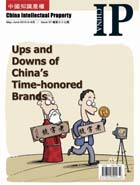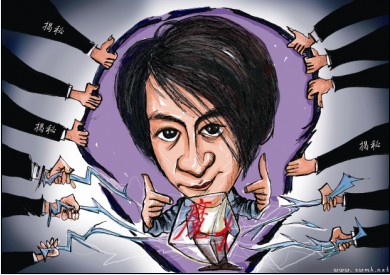“Now let’s witness the moment of miracle.”
The famous remark reminds every one of Liu Qian, currently the most popular magician in China. His quick fame also plunged the country into a “magic craze,” with “magic contests” organized by TV stations, “exposure videos” put on the Internet and TV screens, magic props leading a new consumption trend and “magic schools” have mushroomed.
Exposure, a wound to magicians
“At the CCTV Spring Festival Gala this year, Liu Qian arrived with a bag of tricks and staged a drama. The cup with juice, the specially made table and coins were all props…hostess Dong Qing, the man who didn’t wash his hands, and everybody sitting behind Liu were conspiratorial performers.” The facts are like this: Only ten minutes after Liu’s tricks, a 3 min. 9 sec. exposure video appeared on the Net, which received 2.37 million hits on the first day. A batch of “Liu opponents” gathered on the Net as the “truth” was revealed. Han Han, a popular young writer, also expressed strong criticism in his blog on February 15.
When exposures turn out to be more attractive than the tricks themselves, a senior magician who preferred to remain anonymous said, “Magic exposure in China is simply abnormal.”
“There are presently two kinds of exposures, one from amateurs and the other from insiders,” professional magician Cheng Yi from Beijing told China IP. “The former group attempts to reveal secrets out of curious speculations, which are often inaccurate and do not pressure performers, whereas the latter group usually reveals secrets for fame and profit, which hurts the magician community greatly.”
Earlier, Sichuan TV and Jiangsu TV worked with professional magicians to produce exposure programs. Magician Luo Bin said in an article, “Saving Magic,” “Revealing a magic trick is like taking out an egg by killing the hen. Afterwards, with smiles on their faces and magic lovers beneath their feet, they count bank notes with their blood-stained hands, turning a deaf ear to fans’ moans!”
However, magicians feel more a sense of helplessness than anger. Liu’s agent said, “Liu didn’t apply for patents on his tricks and there is no other law available to seek protection. We have simply no way to stop the various speculations.”
In China, holders of magic patents enjoy the exclusive rights of prop production, sale and performance. However, patents must be obtained by “disclosure.” Cheng Yi said: “Keeping secrets is the supreme law governing the magic community, since disclosure means death. Very few magicians will publicize their tricks.”
From the legislative intent of China’s Copyright Law, many experts believe that magic should be protected. Broadcasting, downloading and disseminating magic performances without permission from related right holders are undoubtedly violations, but simple exposure behaviors don’t constitute a violation of copyrights. This raises the question of whether revealing a trick, perhaps coupled with commercial performances, might violate a “business secret.”
“The law allows different people to possess identical business secrets. It also allows the breaking of right holders’ business secrets through reverse engineering. What the law prohibits is obtaining, using and disclosing right holders’ business secrets through unfair means. Therefore, magic exposure can be regarded as a lawful act of reverse engineering. The free revelation of business secrets which were legally obtained does not violate a magician’s rights,” said Xin Yang from Peking University. Therefore, simple code-breaking does not constitute violation and no right can be claimed.
In reality, there are few lawsuits on magic intellectual property. As an industry living on creations, the sad fact is that it falls outside effective protection of IP laws. Magic is therefore called, “the negative field of intellectual property,” by a foreign scholar. It seems that helpless magicians can only rely on “professional codes” to protect their ideas.
In 1997, Fox TV staged a sweeping program called
Breaking the Magician's Code, with a senior magician revealing to the audience the secrets behind tricks. Many amazing methods thereby became common knowledge. The program incurred many legal suits from magic insiders and as a result the series was finally banned worldwide with the Masked Magician, Leonard Mantano, ostracized from the magic community and chased out of the US for life.
Recently, domestic exposure programs also somewhat restrained themselves to avoid criticism. As an ancient trade group, magicians share a close fellowship and trade ethics seem more effective than law. Cheng Yi told China IP the three principles in magic performance established by a famous American magician, Howard Thurston: Never reveal the secrets behind tricks, never perform the same tricks before the same audience; and never tell the performance content beforehand. Similar principles gradually became a consensus and the universal code of the community. Those violating the rules might be cast out of the association and conference for life.
Rampant piracy in magic props
China’s magic zeal also led to a new consumption trend: props. However, along with the hot sales of props, duplication and piracy are quietly killing this emerging market. The flipper coin Liu Qian used at the Gala is priced at around USD 750 per set, but a key word search at Taobao, a popular online shopping site, returns plenty of them priced between hundreds and even dozens of Yuan. Props of inferior quality can also be found at toy shops for a few Yuan.
China’s small industry of original props manufacturers expressed a feeling of helplessness: “A new product will be duplicated in only two months and at much lower prices. We have to reduce sales to domestic customers to avoid being copied.”
In the absence of a magic prop association in China, producers can only fight piracy through cutting domestic sales apart from mutual restraint on trade codes.
Despite fierce competition, international prop producers have strong awareness of their rights and will apply for patents for new products, so duplications are limited. But in China, right defending in magic props seems to be unheard of.
Actually in China, a late comer, there is also a batch of old magicians living on prop creations who own patents, trademarks and brands, said Cheng Yi. But they are few in number and the price is high. More popular in the market are duplications of low quality and price. They can even be found at magic competitions at home. “People are used to it,” Cheng concluded.
A magic lover wrote in a post: “though hardly counted as an industry, the magic industry, which lives on creations, is being destroyed by exposure and piracy. No one will commit himself to such a bleak career in a place ridden with exposure and piracy. As a long-term magic lover, I hate such behaviors—they ruined the future of the entire magic industry.” IP





